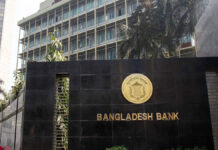Banks’ overall credit growth slowed to 8.01 percent in the first eleven months this year, while at least 16 banks saw their credit fall due to political uncertainty coupled with shutdowns and blockades.
The ongoing political unrest has dented confidence of the borrowers both in urban and rural areas, bankers said.
A branch manager of a bank in Satkhira said there is hardly any transaction these days.
The borrowers are not seeking loans even for the upcoming boro season, which is very unusual, the official said, asking not to be named.
“Usually political chaos cannot put any impact on banking activities in the rural areas. But the scenario is different this time,” he said by phone. “Panic prevails all over.”
According to central bank statistics, banks’ deposit growth has surpassed credit growth by 9.25 percentage points, which may take a toll on their profits and also affect the savers.
Bank’s deposit growth was 17.26 percent on November 14, while credit rose by 8.01 percent, compared to the same day last year.
Due to a huge gap between deposit and credit, banks’ profit growth will be minimal, said Nurul Amin, chairman of Association of Bankers Bangladesh, a platform of chief executives of banks.
He said blockades and shutdowns are hindering banking activities as businesspeople cannot carry on their normal business leading to a fall in the demand for loans.
Amin, also the managing director of NCC Bank, said political violence has spread to the rural areas this time disrupting banking activities there.
The banks cannot even disburse farm and small and medium enterprise loans, he added.
The central bank has allowed local businesses to take loans from foreign sources, which has also caused a fall in the demand for loans.
Amin said banks have taken a cautious stance in providing loans due to a number of scams last year, which is another reason behind the slow credit growth.
Zahid Hussain, lead economist at the World Bank’s Dhaka office, said most of the bank loans are used for trade and as working capital.
As business activities and transportation have come to a halt, there is no demand for such loans.
Hussain said it will have multiple effects — banks’ profit will decrease and classified loans will mark a rise. Also, the government’s revenue will fall.
Meanwhile, both the interest rates on deposit and lending have been going down gradually due to a mismatch between credit and deposit growth.
The average deposit rate fell to 8.47 percent and lending rate to 13.42 percent in October, from 8.61 percent and 13.63 percent in July, according to Bangladesh Bank.
The rates are likely to fall further in January, Amin said.
According to central bank statistics, except Rupali Bank, credit in three state-owned banks declined. The credit growth in Rupali was 20.72 percent.
However, credit growth of BASIC Bank, a state-owned specialised bank, was high — 26 percent.
The central bank should investigate why these banks’ credit growth was so high, bankers said.
Source: The Daily Star










